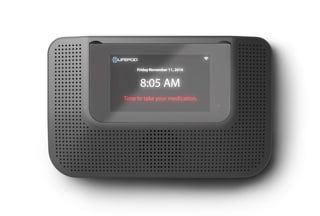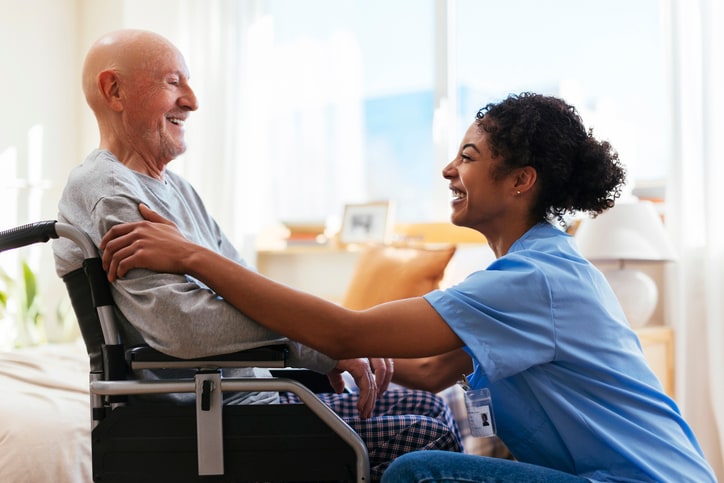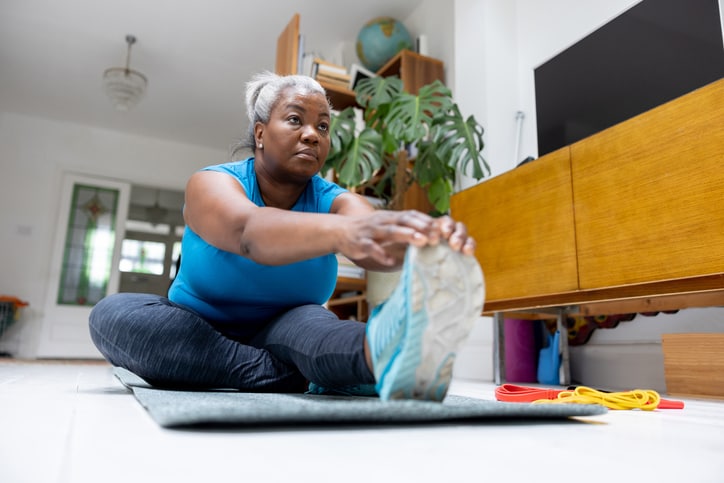We can use the Amazon Echo’s voice-activated virtual assistant, Alexa, to organize a calendar, learn about the weather or today’s news, and even to book travel. But the technology also has the potential to address America’s caregiving challenges.
More than 43 million Americans serve as unpaid caregivers for their loved ones, an increasingly necessary task. As America’s senior population continues to increase, the ratio of family caregivers to elderly people who need care will steadily decline. According to the AARP Public Policy Institute, the ratio will drop to 4:1 by 2030 — a dramatic dip from the 2010 ratio of seven potential caregivers for every person.
Some organizations are experimenting with voice assistants in the senior care space, and companies are emerging to address care challenges, extending the reach of paid and family caregivers beyond the confines of actual physical space. Here’s how voice technology could potentially impact senior care.
Experimenting With Voice Assistants for Senior Care
In recent years, we’ve seen the rise of remote monitoring technologies to help seniors age in place and to help caregivers check in on elderly relatives. Now, we’re seeing experimentation with voice technology, which extends these capabilities and provides an interface that is much easier for caregivers and seniors to use.
The AARP Foundation recently piloted a program with a senior living facility in the Baltimore area to test whether voice-controlled technologies like the Alexa-powered Amazon Echo can help curb isolation and its associated health effects in seniors. The organization worked with Comprehensive Housing Assistance, Inc., to place Amazon Echo devices in its senior living communities, teaching them how to communicate voice commands to Alexa for everything from turning the lights on and off, medication reminders, and getting news and weather reports.
AARP’s pilot project is just one example of how voice technology can help seniors. The LifePod voice-enabled device based on Amazon’s Alexa acts as both a virtual caregiver and a virtual assistant, providing daily reminders for seniors and updates for caregivers.
“LifePod benefits both the senior user and the caregiver,” Stuart Patterson, CEO of LifePod Solutions, Inc., said. “So many of our generation are looking around for technical ways they can avoid having to drive to their parent’s home or independent living facility to check on them. With LifePod, they have more peace of mind they will get some sort of notification if their father, mother, grandfather or grandmother is in trouble.”
Patterson said users will benefit from the “pleasant” reminders.
“They’ll get help if they have dementia, and they’ll have the ability to access online services without having to think about it,” he said.
LifePod is partnering with several home care service providers and senior living facilities to conduct beta tests of its virtual caregiver service. The way the product works is pretty straightforward:
- A primary caregiver for the senior user purchases a LifePod device, connects it to the senior’s Wi-Fi network, and then goes online to set up an account.
- They then can set up pre-programmed routines and three different types of services LifePod initiates…
- Check-Ins: Check-ins allow Alexa to ask a senior how he or she is feeling that day. If the senior responds negatively, the caregiver will automatically receive a text alert and information about this in a daily report.
- Reminders: These reminders can include everything from medication and mealtime reminders to medical appointment, family birthdays, and anniversary reminders.
- Prompted Access: With prompted access to online services, LifePod automatically wakes itself up and asks the senior user whether they’d like to hear today’s news, for example, or other important information their caregiver has pre-programmed into the device.
Patterson said this is crucial because it means a senior doesn’t have to remember to talk to Alexa if he or she doesn’t have a full grasp of how to use the LifePod device or can’t physically operate it. He said another advantage of LifePod and other voice technologies is that the barrier to entry is lower for seniors — even without the help of a caregiver.
“A lot of the senior community feels a little bit cut off from online services, such as Uber or Lyft, simply because they just don’t quite know how to navigate the screen or the touch interface the high-tech world has pushed on them for so many years,” Patterson said. “More information and smaller characters on a screen and more sensitive touch interfaces are exactly contrary to what seniors need over time.”
Voice technology solves this problem, while also giving caregivers access to valuable data and daily reports about how a senior is doing.
LifePod is set to be released next summer, and subsequent releases of the product will feature sensors for fall detection, according to Patterson.
“We definitely believe voice is the interface of the future,” Patterson said. “What we’re bringing with LifePod is a voice-first approach that is tailored to the community who will benefit from it the most.”
The product could be one of many voice-driven virtual caregivers and companions that emerge as America’s caregiving gap widens.
*Care.com does not endorse or recommend any commercial products, processes, or services. The views and opinions of authors expressed on Care.com do not necessarily state or reflect those of Care.com, and they may not be used for advertising or product endorsement purposes.



